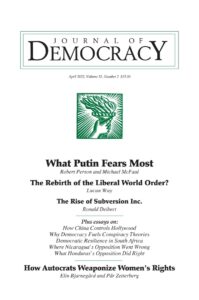 Russia’s invasion of Ukraine is viewed as a gut-check moment in what U.S. President Joe Biden has described as the 21st -century contest between democracy and autocracy, CSM reports. The Kremlin’s aim, to erase Ukraine as an independent state, and Ukrainian President Volodymyr Zelenskyy’s response, to frame the war as a wider battle for democracy, have been clear since the outset.
Russia’s invasion of Ukraine is viewed as a gut-check moment in what U.S. President Joe Biden has described as the 21st -century contest between democracy and autocracy, CSM reports. The Kremlin’s aim, to erase Ukraine as an independent state, and Ukrainian President Volodymyr Zelenskyy’s response, to frame the war as a wider battle for democracy, have been clear since the outset.
Anton Barbashin, the editorial director of the online journal “Riddle Russia,” told Newsweek that the war has gone “too far” and that “there are no longer good options” for Putin or the Kremlin.
 Ukraine has become a bulwark against authoritarian aggression, and it is critical that democratic institutions continue their support, say IRI’s Jessica Meyerzon and Janelle Clausen. As historian Serhii Plokhy phrases it, Ukraine stands at “the gates of Europe” and the world – and it should not stand alone.
Ukraine has become a bulwark against authoritarian aggression, and it is critical that democratic institutions continue their support, say IRI’s Jessica Meyerzon and Janelle Clausen. As historian Serhii Plokhy phrases it, Ukraine stands at “the gates of Europe” and the world – and it should not stand alone.
Russia has zero prospects of becoming more democratic as long as Putin remains in power, argues David J. Kramer, managing director for global policy at the George W. Bush Institute and former assistant secretary of state for democracy, human rights, and labor. His departure from the scene would by no means guarantee the transition to a democratic Russia, but it would for the first time in decades afford the country – and others – the possibility of moving in that direction, he writes for the Journal of Democracy.
 Few people think more about how to engage Russian audiences than Volodymr Zelensky. He thrives on empathy, finding common ground with his audience. That’s what he did as an actor, a stand-up comedian, and a sketch-show satirist, writes Peter Pomerantsev, a fellow at the SNF Agora Institute at Johns Hopkins University and the author of This Is Not Propaganda: Adventures in the War Against Reality and Nothing Is True And Everything Is Possible:
Few people think more about how to engage Russian audiences than Volodymr Zelensky. He thrives on empathy, finding common ground with his audience. That’s what he did as an actor, a stand-up comedian, and a sketch-show satirist, writes Peter Pomerantsev, a fellow at the SNF Agora Institute at Johns Hopkins University and the author of This Is Not Propaganda: Adventures in the War Against Reality and Nothing Is True And Everything Is Possible:
I met with him alongside Jeffrey Goldberg and Anne Applebaum to interview him for The Atlantic, and when I told him I was born in Kyiv, he spoke to me without ever breaking eye contact—he had found his common ground with me. This is key to his communications strategy at all levels, with individuals and with countries. Every time he addresses another country’s legislature, he and his team research its history to find a point of commonality with what Ukraine is experiencing now.

Meduza
Backing the (now largely exiled) independent Russian media is vital. In the past, these outlets and organizations have typically appealed to an already prodemocracy audience. But democratic governments’ efforts to reach everyday Russians have to be utterly different, he contends:
Think online town halls involving ordinary Russians, where Western celebrities who have large Russian fan bases, such as Arnold Schwarzenegger (whose recent video appeal to his Russian fans got millions of views) envision a different Russia. Think responsive media, where Russians can ask for details about what is happening at the front, and receive evidence-based answers. Think online forums, where doctors discuss how ordinary people can manage the looming Russian health crisis.…RTWT
Ukraine has become a bulwark against authoritarian aggression, and it is critical that democratic institutions continue their support, say @NEDemocracy partner @IRIglobal experts @JMeyerzon & @JanelleClausen https://t.co/jZVzl9CnoP
— Democracy Digest (@demdigest) May 4, 2022







